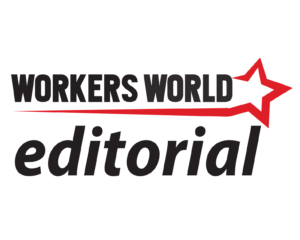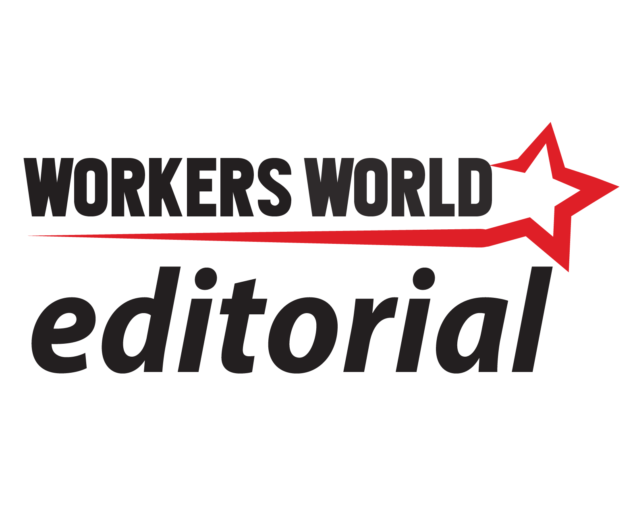



We are coming to the end of another year, another decade. What are the significant events to consider?
The U.S. war on Afghanistan, begun in 2001, continued, while the bankruptcy of U.S. imperialism was recently revealed by the Washington Post in “The Afghanistan Papers.” This review of internal U.S. government documents shows how those exercising state power, across three presidential administrations, intentionally and systematically lied about the purpose, price and likelihood of “winning” that war.
At the cost of trillions in money and thousands in lives, the U.S. has hung on in hope of claiming Afghanistan’s mineral deposits worth trillions to U.S. corporations.
We could list crime after crime committed in this decade by the U.S. in desperate search of expanding capitalist profits.
But the decade has another narrative to offer — the story of a growing mass struggle against capitalism.
2011 The Occupy Wall Street movement began on Sept. 7 in Zuccotti Park, New York City, where protesters issued a challenge to intertwined state and corporate power. Before police violence closed the encampment, the Occupy movement had spread throughout the U.S. and internationally. With the slogan “We are the 99%,” the movement denounced the wealthy 1% and corporate control over government.
2012 The 26,000 teachers in the Chicago Teachers Union won a contract redefining the struggle for the rights of education workers, and the right to education, in the U.S. Remaking itself into a member-driven, social-justice union, the CTU challenged the privatizing charter school movement and corporate control of public schools. The CTU strategy spread nationally into educator organizations and union halls. Beginning in 2016 #RedforEd teacher strikes swept from West Virginia to Oklahoma, Arizona, Colorado to the West Coast — and back to Chicago in 2019 — using rank-and-file worker and community power to fight for public schools.
2013 & 2014 Three radical Black organizers — Alicia Garza, Patrisse Cullors and Opal Tometi — created #BlackLivesMatter after the acquittal of the killer of African-American teenager Trayvon Martin. In growing outrage over continued murders and police killings of Black people, enormous mass marches and shut-downs militantly occupied highways, subway lines and buildings. The movement accelerated after the 2014 death-by-cop of African Americans Michael Brown in Ferguson, Mo., Eric Garner in New York City and Tamir Rice in Cleveland, and the banner of #BlackLivesMatter was lifted internationally.
2015 With a U.S. Supreme Court decision, same-sex marriage was legalized on a national basis–a survival right for LGBTQ2+ people to safeguard families and gain access to financial benefits. The ruling was won by almost 30 years of organizing, focusing first on decriminalizing sodomy — a felony prosecuted almost exclusively against LGBTQ2+ people. Massive civil disobedience at the Supreme Court in 1987 and years of state-by-state organizing resulted in SCOTUS striking down sodomy as a criminal act in 2003, ultimately paving the way to this win.
2016 The Indigenous Water Protector actions at Standing Rock and the Dakota Access Pipeline protests began in early 2016 when Indigenous youth organized a direct action and social media campaign to stop the pipeline. Joined by adults, including Joye Braun of the Indigenous Environmental Network and tribal historian LaDonna Brave Bull Allard, they established a camp as the center for direct action, spiritual resistance to the pipeline, cultural preservation and defense of Indigenous sovereignty. During months of struggle, many peoples defended the land and water, often confronting U.S. state forces.
2017 Tarana Burke, an African-American activist began using the phrase “Me Too” in 2006 on social media to raise awareness of an epidemic of sexual abuse and assault, especially against girls and women of color. #MeToo went viral in 2017 after women tweeted their personal experiences of abuse, often by men in positions of power. In January a massive Women’s March protested predator and abuser Trump’s inauguration as president, and low-wage women workers began using #MeToo to fight sexual abuse in the workplace.
2017 After a murderous Unite the Right rally of white supremacists and neo-Nazis in Virginia on Aug.12, a powerful coalition of anti-racist, anti-fascist forces pulled down a Confederate statue in Durham, N.C., on Aug. 14. The bold act accelerated protests challenging racist monuments and flags, and scores were defaced, pulled down, legally challenged and removed.
2018 Socialism became a mainstream media buzz word, as a record number of U.S. workers went on strike or held work stoppages, starting with the West Virginia education workers walking out and ending with a national strike by Marriott Hotel workers winning protections against sexual abuse and for im/migrant workers. Attacks on the Affordable Care Act and Medicaid/Medicare sparked a renewed movement of disabled people, with hundreds arrested at Congressional hearings.
2019 Thousands of people demonstrated in hundreds of cities in June demanding “Close the Camps.” Galvanized by continuing federal imprisonment of im/migrants seeking asylum at the southern border, protesters began to accurately denounce such imprisonment “concentration camps” where parents and children were brutally separated and people were housed indefinitely in life-threatening circumstances.
In September millions turned out internationally in the Global Climate Strike. While Greta Thunberg of Sweden became the mainstream face of the strike, it was initiated by young people of all nationalities in their teens all over the world, like Ruth Weaver of Massachusetts who said, “The real planet killers at work here are the corporations. . . . This is not our fault but now it is our responsibility to take on these corporations.” (workers.org, Sept. 24)
International resistance and struggle against imperial capitalism continued in 2019 as China celebrated the 70th anniversary of its communist revolution, and Cuba, Bolivarian Venezuela and the Democratic People’s Republic of Korea (north Korea) continued strong and committed to the road to socialism, despite U.S. attempts at economic destabilization and “regime change.”
In 2018 and 2019 enormous international protests and strikes, many led by Indigenous peoples and some called by labor union and environmental coalitions, exploded against capitalist austerity measures and neocolonial exploitation in Algeria, Bolivia, Brazil, Chile, Colombia, Ecuador, France, Haiti, Mali, Puerto Rico and elsewhere.
This communist review of the decade reveals that growing mass consciousness and activism are aimed at the intertwined abuses of capitalist state power and corporate exploitation that are reinforced through all forms of bigotry.
Such a mass mobilization can collectively build the road toward revolutionary socialism.
The epic struggle of the Palestinian people against the full weight of U.S. imperialism and…
The following report comes from the Bronx Anti-War Coalition organizers on a protest held in…
In the Canadian federal elections held on April 28, the Liberals won with 169 seats…
The following is Part 2 of a talk given by the author to a meeting…
Boston Students, professors and workers are confronting the Trump administration’s fascist crackdown at universities across…
Philadelphia Within days of Swarthmore students reviving a pro-Palestinian encampment on April 30, police arrested…